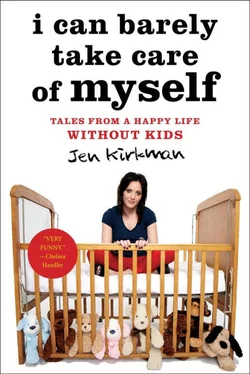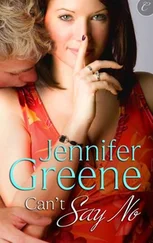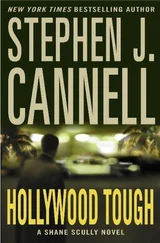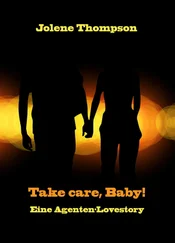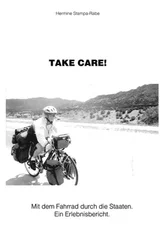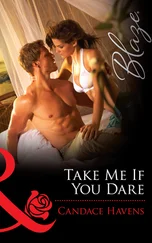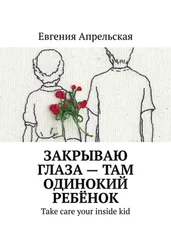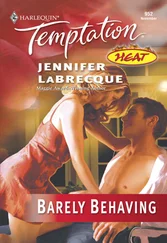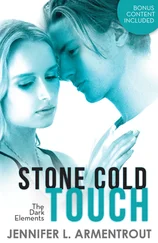3. Toddlers Without Borders
Sitting on my coffee table are Vanity Fair magazines dating back to December 2010 that I haven’t had a chance to read yet. My DVR is full of Real Time with Bill Maher episodes from the 2012 election that I’ll get around to watching by the 2016 election, I’m sure. I do not know where all of this “spare time” is that people who have kids always tell me I have.
I’m also totally ADHD. Yes, it’s a real disease, but I admit that “totally ADHD” is not a real medical term. I have an actual hyperactivity disorder and that’s why when I drink coffee, I get sleepy. I got excited when my doctor gave me a prescription for an ADHD medication that can make you feel jumpy and lose weight. The catch is that you only get jumpy and lose weight if you abuse the medication. When you take ADHD medication as needed, you just feel even-keeled, and it made my skin break out. I spent a year on these meds with a new temperament and oily skin. It felt freaky, like I was some kind of well-adjusted teenager. I stopped taking it because I’m vain and I’d rather suffer quietly in my head than break out on my forehead. These days I just deal with my ADHD by allowing myself to stare at walls, pace, lose my keys, and find myself with hours and hours of time that I can’t account for.
People often seem to think that this “spare time” of mine ought to be filled with trips to the pediatrician, Mommy and Me movies, and annual pumpkin patches. They ask me whether I worry about feeling “unfulfilled” without raising children. When you grow up having a panic disorder, anxiety, and depression since age nine, it’s pretty easy to be fulfilled at age thirty-eight just by the knowledge that you’re no longer an overmedicated or stressed-out little neurotic. In fact, I’m not only having a second childhood, I feel like I’m finally having a first. The last thing I want to do is bring a kid into all of this fun, leaving me to become the chaperone.
I spent about thirty years of my life being too afraid to travel and constantly worried that I was going to die in a plane crash ( What if this plane crashes? or sometimes the odd What if this plane above me falls out of the sky and onto my head? ). I’d like another thirty years of enjoying how I’m totally not afraid anymore, and the only child I have time for is my inner one. (She can’t believe she’s been to Disney World ten times and never had the guts to ride Space Mountain.)
When I was growing up in the 1980s, adults used to let Practical Steps in Preventing Children from Dying slide a little bit—like not mandating seat belts on school buses. Yet they worried incessantly about nuclear war—a thing that might happen but, unless they were Ronald Reagan or Gorbachev, they had absolutely no control over.
I’d always had a general sense of well-being and hope for the future until one fateful weeknight in November 1983 when I suddenly didn’t. That was the night that I sat down with my parents at the age of nine and watched the made-for-TV movie The Day After. The film portrays a fictional war between NATO forces and the Warsaw Pact that rapidly escalates into a full-scale nuclear exchange between the United States and the Soviet Union.
Apparently Ronald Reagan wrote in his diary that the film was “very effective and left me greatly depressed,” and that it changed his mind on the prevailing policy on a “nuclear war.” (Thank you, Wikipedia!)
After I watched the movie, I wrote in my diary as well. My sentiment was slightly different from President Reagan’s. I wrote, “I hope I kiss a boy and fall in love before the world ends and that he’s the one I die with in the nuclear war.” I was such a little romantic.
My elementary school teacher, Mrs. Williams, had very strong feelings about her students watching The Day After. She sent all of us fourth graders home with a note, strongly urging our parents to forbid us from watching. When I brought the warning letter home my parents were offended that my teacher had the audacity to tell them how to shield their daughter effectively from a life of post-traumatic stress disorder. I had signed my name on the dotted line, under the promise “I will not watch this movie.” My mom put the letter aside. “Jennifah, where was Mrs. Williams when the boys were throwing snowballs at you after school and calling you a geek? She just told me, ‘Boys will be boys,’ and now she thinks she can send home notes telling me what to let you watch? Maybe if more kids watched this movie, they wouldn’t be such little shits on the playground.”
Yes. Maybe if more kids watched a supposedly realistic enactment of a nuclear holocaust, kids would be off playgrounds completely and instead roaming the halls of their local mental institutions or in line at the pharmacy for some nice prescription opiates.
I’ll never forget the scene where the nuclear bombs from the Soviet Union hit Lawrence, Kansas—all portrayed with that (Emmy-nominated) stock footage of mushroom clouds. Residents of Lawrence, Kansas, are on the highway. The traffic is bumper to bumper. The entire state is desperate to drive away from the three hundred incoming nuclear missiles from Russia, but no one makes it out alive. The sky zaps and rumbles. Flashes of red and orange appear and then a white mushroom cloud rises on the horizon and, just like they’re being X-rayed, the people in their cars go from bodies to bones in an instant. Skeletons suddenly sit behind the wheels of cars.
My dad tried to console me with realism. “Jen, this movie isn’t completely true. If the Russians bomb us, they’ll hit Washington, DC first. Besides, the Russians don’t want to nuke us because then we’ll nuke them off the face of the planet.”
The Day After ended with Jason Robards’s character nearly disintegrating into the arms of another man as they sat helpless among the ruins of Lawrence, Kansas. They held each other as they waited for their last breaths. I rabidly read the credits, which assured me that this was just a fictional event. My mother talked over the disclaimers. “You know what I’m realizing? We don’t have the right kind of basement for a nuclear war. It’s too porous and Ronnie, when are you going to fix that old, rotten cellar door? That’s not going to keep out radiation. I guess we could drive to Jennifah’s school and stay in the bomb shelter there.”
That was news to me. There was a bomb shelter under my school? I decided that I no longer trusted adults. First you have your crazy adults, like the ones who want to run countries and start wars. Then you have your lying adults, like my teacher who pretends war isn’t possible even though she’s teaching us state capitals directly over a bomb shelter. If there was no way that a nuclear war could happen, why was I forbidden to watch a movie about it? Why didn’t my teacher send home a note warning parents not to take their kids to see Poltergeist ? I now believed that war was imminent and this was everyone’s way of educating us about what to do because no one had the guts to just tell us, “We do frequent tests of the Emergency Broadcast System because we know that soon there will be an actual emergency.”
The next day on the walk to school I told my best friend, Shannon, about the movie. She hadn’t watched it. She declared that her mom grew up in England and knew a lot about Europe and other countries. “So, if there was going to be a war, she would have told me.” I felt bad for Shannon. Her naive apocalypse mentality was going to leave her caught by surprise.
FOR A LONG time, I had the coping mechanism to push the utter terror that was known simply as “being alive” to the back of the cupboard of my brain. I loved life. I was a spunky kid. All I wanted to do was to have fun. So despite my grave misgivings about nuclear holocaust, I was still excited for our school field trip to Plymouth Plantation, which is a Disney World–esque pastiche of a rural 1600s community in Plymouth, Massachusetts—home of the Mayflower landing. It’s also a place for Boston-area actors to get some work, either a pit stop on their way to their real ambitions or the final resting place of a career that never blossomed. Plymouth Players acted as carpenters, milkmaids, and blacksmiths, carrying on as if it were really the 1600s, demonstrating their skills without any modern conveniences.
Читать дальше
